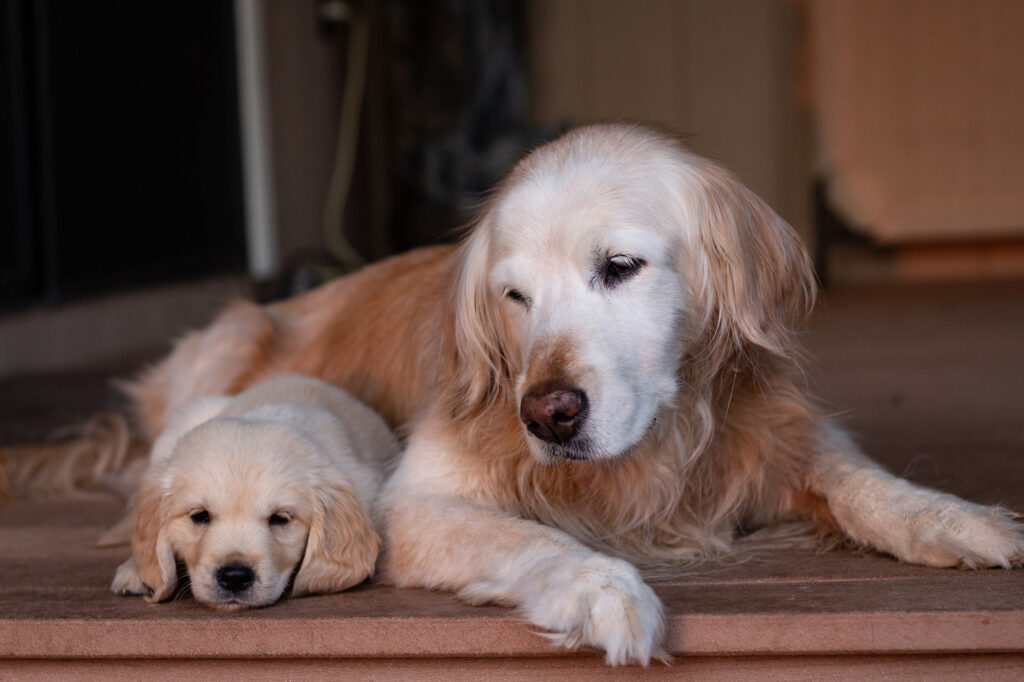Time flies with a dog! From the playful antics of puppies to the calm companionship of seniors, every stage of a dog’s life offers its own unique rewards and challenges.

It’s up to you as a dog trainer to remind your clients that puppyhood will be soon be over, and their pup will transform into an eager grown-up. Even those adult years pass far too quickly. A decade can pass in a blink of an eye, and suddenly the puppy they adopted as incentive to hike every state park has become a senior — and all they’ve done together is walk the local greenways.
Help your clients make the most of life with their dog from the earliest days. These tips will help them maintain an active friendship with their dog at all stages of life.
Puppyhood
Puppies are adorable, playful, and curious! However, they can also be a handful, requiring healthy diversions for busy teeth and benefiting from training and socialization to help them become well-adjusted adults. Encourage your community to consider puppy classes, where they can learn and practice basic life skills, socialization, and other important skills.
Also remind clients to take photos and videos of their puppy’s antics at that silly, wonderful round-then-gangly stage of their life, and maybe even schedule a formal portrait session now, and then again later as an adult. They’ll cherish a reminder of that puppy face, those puppy paws, and even puppy breath!
A scrapbook or journal is a great way to track a pup’s progress through life, whether it’s on paper or virtual. There are lots of free online platforms, like Blogger or Instagram, where they can upload pics and jot down stories to share with invited friends or with the world.
Adolescence
As puppies spring up into young adults, your clients will see benefits from positive training and socialization. They may also find themselves with a dog bursting with energy and eager for those hikes and adventures they dreamed of when you first thought “Maybe I should get a dog.”
Encourage your clients to get those activities on their calendar! In addition to hiking, why not agility, fly ball, or nose games? These activities can help keep a dog physically and mentally fit while providing fun and bonding time for both dog and handler. A full schedule of fun can also stretch out those months so time feels long and full, instead of scant and speedy.
Adulthood
When dogs reach adulthood, some clients may find their dogs have settled into a routine and are aging into a calm, steady companion. This older, more relaxed canine may be happy to sprawl out at a dog-friendly café or brewery, and other community functions that were once just too exciting for their dog’s younger self.
At this time of life it’s important to continue to maintain exercise at a level the dog enjoys, to keep them at a healthy weight and keep joints and muscles supple. And remember to keep that blog or journal updated! Just as suddenly as that puppy face disappeared, that first gray hair appearing on their dog’s muzzle seems to catch people by surprise.
Seniors
As their dog enters their senior years, clients may notice their dog has slowed down and needs extra care and attention. However, even when a dog walks more slowly and turns back toward home more quickly, they are still a devoted companion, with lots of love and affection to give.
Encourage your clients to make the most of their time with their senior dog, taking gentle walks, providing comfortable bedding, and enjoying quiet moments together. Gentle exercises or massage can help keep their dog comfortable and healthy as they age. Even if an older dog sometimes races around like a puppy, remind clients to watch for signs of age. If the dog who still hikes miles a day no longer engages in twenty minutes of zoomies after a bath, age is probably having an impact.
Also remind clients that older dogs still enjoy using their brain! Suggest trying some cognitive training activities, like food puzzles or scent work, to help keep their dog’s mind sharp.
Geriatric care
Clients may call you for advice about end-of-life care, since they have come to know you as a person they can talk to freely about their dog. Of course, you want to be certain they are communicating with their veterinarian, but sometimes people worry about taking up too much of their vet’s time, and they just want someone to talk to about their own feelings, worry, and grief.
As a canine expert, you can steer them toward equipment like a dog mobility harness or sling, that can help them assist an older dog outside for potty breaks and to enjoy the outdoor air. You can remind them of questions to ask their veterinarian, like supplements to help with joint care or anxiety. You can also share resources on making end-of-life decisions, like this fact sheet from American Humane.
Most importantly, invite them to look back over the wonderful life they’ve enjoyed with their dog, and to think back to the adventures they’ve shared together, the places they’ve lived, and the people and other pets they’ve met.
The Victoria Stilwell Academy would like to be part of your journey, too
Where could you be within 6 months to a year if you were to start our Dog Trainer Course? Are you sharing life with a dog and ready to take the first step toward an exciting new career? If so, the VSA team is here to help! Check out our FAQs to learn more. Maybe soon you and your dog will be celebrating your graduation from our flagship Dog Trainer Course and the friendships you’ve made there!



